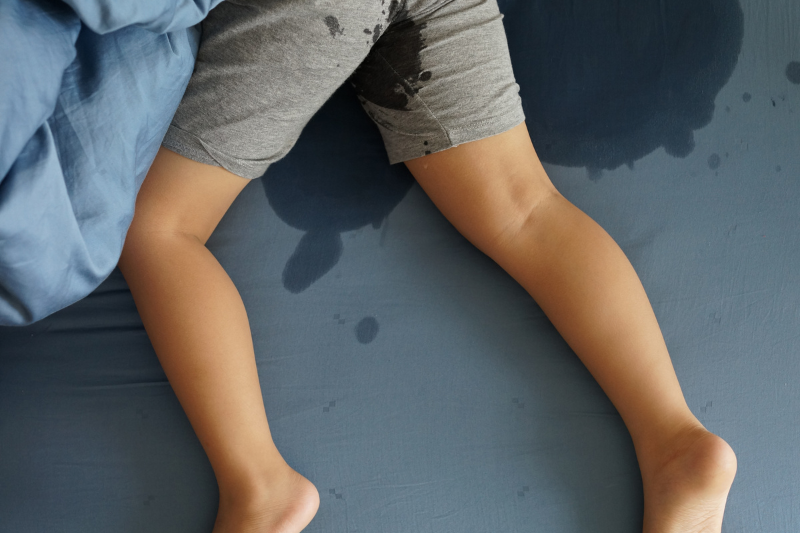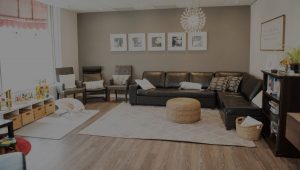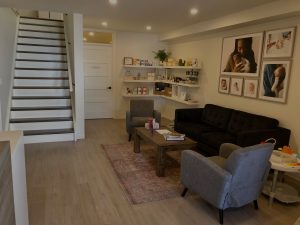Adults aren’t the only ones who have issues with their pelvic floor – many children deal with challenges like bedwetting, constipation, or incontinence. There is a high and growing prevalence of paediatric pelvic floor dysfunctions. Up to 50% of pediatric urologist consults are for constipation1 and 5-10% of seven year-olds experience enuresis (leaking urine).2 Pediatric pelvic physiotherapy is a high effective non-invasive treatment option for children to help improve symptoms, quality of life and may prevent chronicity.3

What we can help with:
- Prevention of any pelvic health issues through optimal toilet learning
- Dysfunctional voiding
- Constipation
- Enuresis (urinary incontinence)
- Nocturnal Enuresis (bedwetting)
- Encopresis (fecal incontinence)
- Overactive bladder or underactive bladder (peeing too often or not frequently enough)
- Fear of urinating or defecating
What to Expect on your child’s first visit
Our pediatric pelvic health physiotherapist’s first goal is to have both child and parent/guardian feel comfortable and supported, as we know bladder and bowel issues are often associated with pain, embarrassment, and anxiety. We ask questions and engage the child to participate in the assessment in a relaxed and fun way.
- Health History: We will ask about the challenges you’ve experienced, any medical tests or diagnoses your child may have received, bladder/bowel habits, toilet learning success or lack thereof, child’s fluid intake and diet, sleep patterns and activity patterns.
- Physical Exam: We will look at your child’s posture and breathing, joint mobility, muscle length, strength and coordination. In some instances, we may also want to evaluate the external pelvic floor muscles (visual look and/or palpation) with the consent of the child and parents/guardians. You and your child have the option to choose or refuse any part of the treatment with which you don’t feel comfortable. Unlike the process for adults, there is no internal examination of the pelvic floor muscles for children.
- Client and Family Centred Goals: We want to hear the goals of both the parents/guardians and the child, as we recognize that these issues impact the entire family.

Care Plan:
We tailor each care plan based on the findings of the assessment and on your family’s goals, while keeping it fun, and rewarding for your child. We focus our care plans around self-management support principles to ensure all aspects of a healthy lifestyle are integrated. Care plans can include:
- Education on bladder & bowel function and its relationship to the pelvic floor, proper toilet positioning, wiping habits and more
- Bladder and bowel retraining schedule
- Counselling on lifestyle or behaviour modification, diet and exercise, sleep patterns
- Manual techniques (external) if needed
- Collaborating with the rest of your care team such as your Paediatrician, Naturopath, etc.
If you have any questions, please don’t hesitate to set up an appointment to meet with us at The WOMB or check out our Toddler Toilet Learning & Pelvic Health workshop.
Written by Lea Damata, PT
 Lea is a Pediatric Pelvic Physiotherapist at The WOMB. She is a graduate from McMaster University with a Masters of Science degree in Physical Therapy, and York University with a Bachelors of Science in Kinesiology. Lea’s diverse paediatric experiences, including her work at McMaster Children’s Hospital and Holland Bloorview Kids Rehabilitation Hospital, has also fostered a special interest working with children. She was the recipient CanChild’s Paediatric Research Award in 2017.
Lea is a Pediatric Pelvic Physiotherapist at The WOMB. She is a graduate from McMaster University with a Masters of Science degree in Physical Therapy, and York University with a Bachelors of Science in Kinesiology. Lea’s diverse paediatric experiences, including her work at McMaster Children’s Hospital and Holland Bloorview Kids Rehabilitation Hospital, has also fostered a special interest working with children. She was the recipient CanChild’s Paediatric Research Award in 2017.
lea@thewomb.ca
References:
1. Burgers et al. Management of functional constipation in children with lower urinary tract symptoms; Report from the Standardization Committee of the International Children’s Continence Society. J Urol, 2013;190(1):29-36.
2. Nevéus et al. Management and treatment of nocturnal enuresis – an updated standardization document from the International Children’s Continence Society. J. Pediatr. Urol, https://doi.org/10.1016/j.jpurol.2019.12.020.
3. Lonkhuyzen et al. Effectiveness of Pelvic Physiotherapy in Children With Functional Constipation Compared With Standard Medical Care. Gastroenterology, 2017;152:82–91





